display Citroen GRAND C4 PICASSO 2017 2.G Repair Manual
[x] Cancel search | Manufacturer: CITROEN, Model Year: 2017, Model line: GRAND C4 PICASSO, Model: Citroen GRAND C4 PICASSO 2017 2.GPages: 527, PDF Size: 12.91 MB
Page 174 of 527
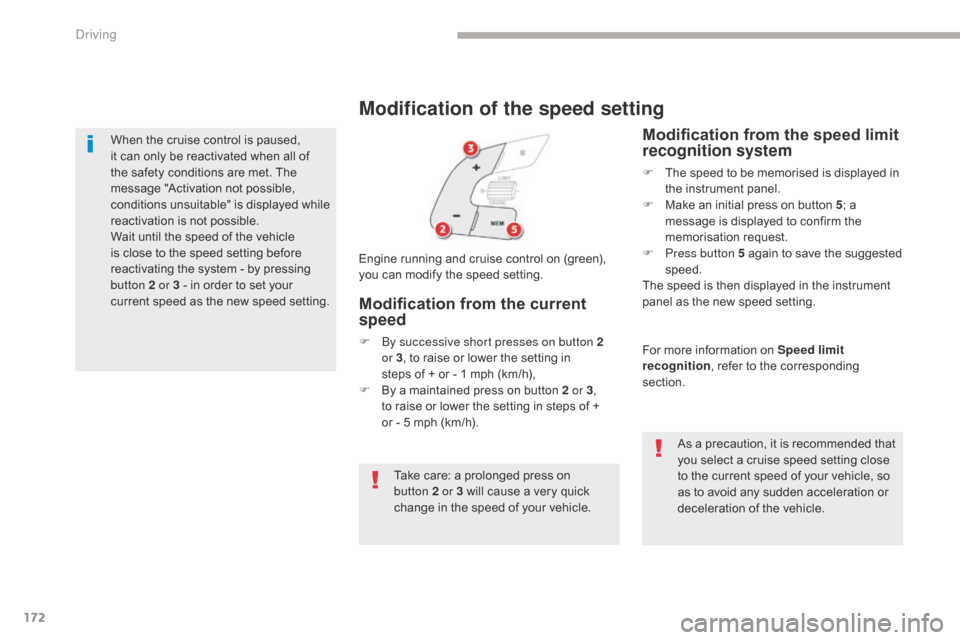
172
C4-Picasso-II_en_Chap04_conduite_ed02-2016
When the cruise control is paused,
it can only be reactivated when all of
the safety conditions are met. The
message "Activation not possible,
conditions unsuitable" is displayed while
reactivation is not possible.
Wait until the speed of the vehicle
is close to the speed setting before
reactivating the system - by pressing
button 2 or 3 - in order to set your
current speed as the new speed setting.
Modification of the speed setting
Modification from the speed limit
recognition system
F The speed to be memorised is displayed in the instrument panel.
F
M
ake an initial press on button 5 ; a
message is displayed to confirm the
memorisation request.
F
P
ress button 5 again to save the suggested
speed.
The speed is then displayed in the instrument
panel as the new speed setting.
As a precaution, it is recommended that
you select a cruise speed setting close
to the current speed of your vehicle, so
as to avoid any sudden acceleration or
deceleration of the vehicle.
For more information on Speed limit
recognition
, refer to the corresponding
section.
Engine running and cruise control on (green),
you can modify the speed setting.
Modification from the current
speed
F By successive short presses on button 2
or 3, to raise or lower the setting in
steps of + or - 1 mph (km/h),
F
B
y a maintained press on button 2 or 3 ,
to raise or lower the setting in steps of +
or
- 5 mph (km/h).
Take care: a prolonged press on
button
2 or 3 will cause a very quick
change in the speed of your vehicle.
Driving
Page 175 of 527

173
C4-Picasso-II_en_Chap04_conduite_ed02-2016
Modification of the inter-vehicle distance setting
Three predefined inter-vehicle distance settings
are offered:
-
"
Distant" (3 dashes),
-
"
Normal" (2 dashes),
-
"
Close" (1 dash). Engine running and cruise control selected
(grey), you can modify the inter-vehicle
distance setting:
F
p
ress button 6 to display the selection
screen for inter-vehicle distance,
F
p
ress button 6 repeatedly to cycle through
the predefined settings.
The selection screen closes after a
few seconds.
The modification is then taken into account.
This setting remains in memory, whatever the
state of the system and when the ignition is
switched off.
It is possible to exceed the speed setting
temporarily by depressing the accelerator
pedal.
The cruise control no longer manages the
braking system during this period.
Simply release the accelerator pedal to return
to the programmed speed.
If the programmed speed setting is exceeded,
the display of the speed setting disappears
and a message "Cruise control suspended"
is displayed until the accelerator pedal is
released.
Exceeding the programmed
setting
4
Driving
Page 176 of 527

174
70
70
C4-Picasso-II_en_Chap04_conduite_ed02-2016
Driving situations and associated alerts
To benefit from all of the information available in the instrument panel, you must first select the "DRIVING" display mode.
The following table describes the alerts and the messages displayed for the different driving situations.
The display of these alerts is not sequential.Indicator Display Associated messageComment
according to the inter-vehicle
distance selected "Cruise control paused" System paused.
No vehicle detected.
according to the inter-vehicle
distance selected "Cruise control paused" System paused.
A vehicle has been detected.
according to the inter-vehicle
distance selected "Cruise control on"
System activated.
No vehicle detected.
according to the inter-vehicle
distance selected "Cruise control on"
System activated.
A vehicle has been detected.
or "Cruise control suspended"
System activated.
The driver has temporarily taken control of the vehicle by
accelerating.
Driving
Page 177 of 527
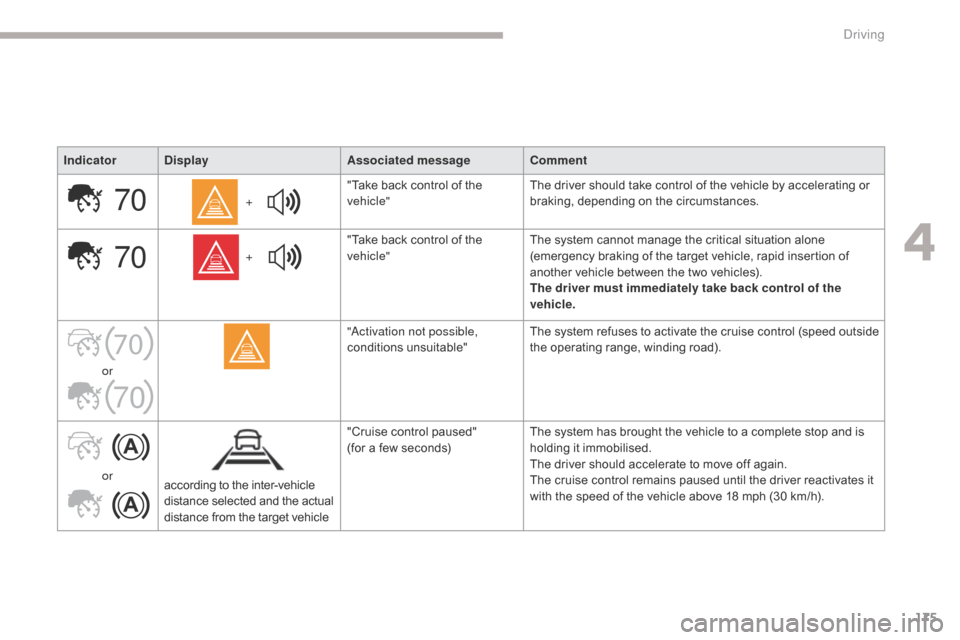
175
70
70
70
70
C4-Picasso-II_en_Chap04_conduite_ed02-2016
IndicatorDisplay Associated messageComment
+ "Take back control of the
vehicle"
The driver should take control of the vehicle by accelerating or
braking, depending on the circumstances.
+ "Take back control of the
vehicle"
The system cannot manage the critical situation alone
(emergency braking of the target vehicle, rapid insertion of
another vehicle between the two vehicles).
The driver must immediately take back control of the
vehicle.
or "Activation not possible,
conditions unsuitable"
The system refuses to activate the cruise control (speed outside
the operating range, winding road).
or according to the inter-vehicle
distance selected and the actual
distance from the target vehicle "Cruise control paused"
(for a few seconds)
The system has brought the vehicle to a complete stop and is
holding it immobilised.
The driver should accelerate to move off again.
The cruise control remains paused until the driver reactivates it
with the speed of the vehicle above 18 mph (30 km/h).
4
Driving
Page 179 of 527
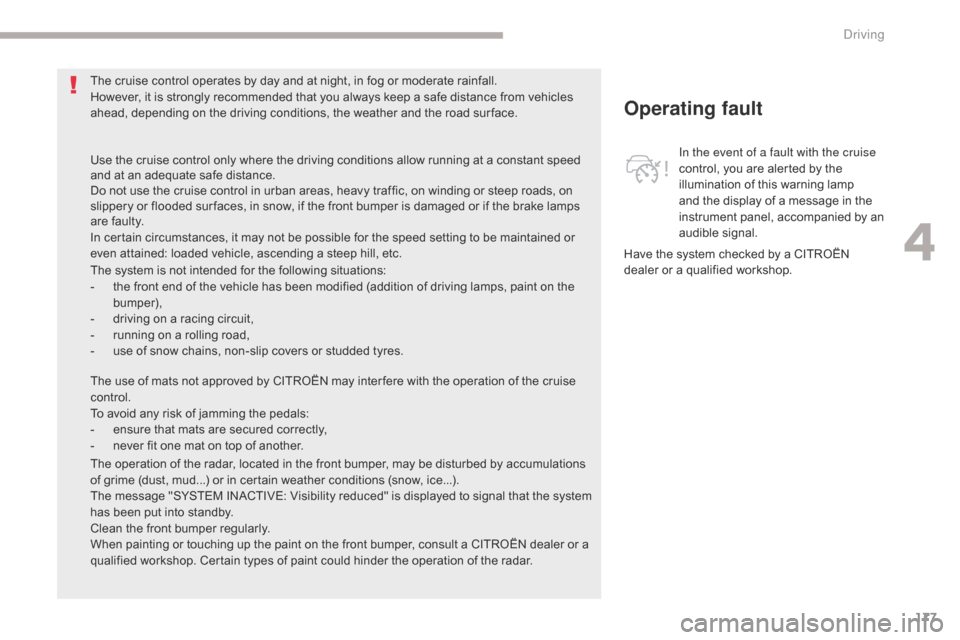
177
C4-Picasso-II_en_Chap04_conduite_ed02-2016
Operating fault
In the event of a fault with the cruise
control, you are alerted by the
illumination of this warning lamp
and the display of a message in the
instrument panel, accompanied by an
audible signal.
The cruise control operates by day and at night, in fog or moderate rainfall.
However, it is strongly recommended that you always keep a safe distance from vehicles
ahead, depending on the driving conditions, the weather and the road sur face.
Use the cruise control only where the driving conditions allow running at a constant speed
and at an adequate safe distance.
Do not use the cruise control in urban areas, heavy traffic, on winding or steep roads, on
slippery or flooded sur faces, in snow, if the front bumper is damaged or if the brake lamps
are faulty.
In certain circumstances, it may not be possible for the speed setting to be maintained or
even attained: loaded vehicle, ascending a steep hill, etc.
The system is not intended for the following situations:
-
t
he front end of the vehicle has been modified (addition of driving lamps, paint on the
bumper),
-
d
riving on a racing circuit,
-
r
unning on a rolling road,
-
u
se of snow chains, non-slip covers or studded tyres. Have the system checked by a CITROËN
dealer or a qualified workshop.
The operation of the radar, located in the front bumper, may be disturbed by accumulations
of grime (dust, mud...) or in certain weather conditions (snow, ice...).
The message "SYSTEM INACTIVE: Visibility reduced" is displayed to signal that the system
has been put into standby.
Clean the front bumper regularly.
When painting or touching up the paint on the front bumper, consult a CITROËN dealer or a
qualified workshop. Certain types of paint could hinder the operation of the radar. The use of mats not approved by CITROËN may inter fere with the operation of the cruise
control.
To avoid any risk of jamming the pedals:
-
e
nsure that mats are secured correctly,
-
n
ever fit one mat on top of another.
4
Driving
Page 181 of 527
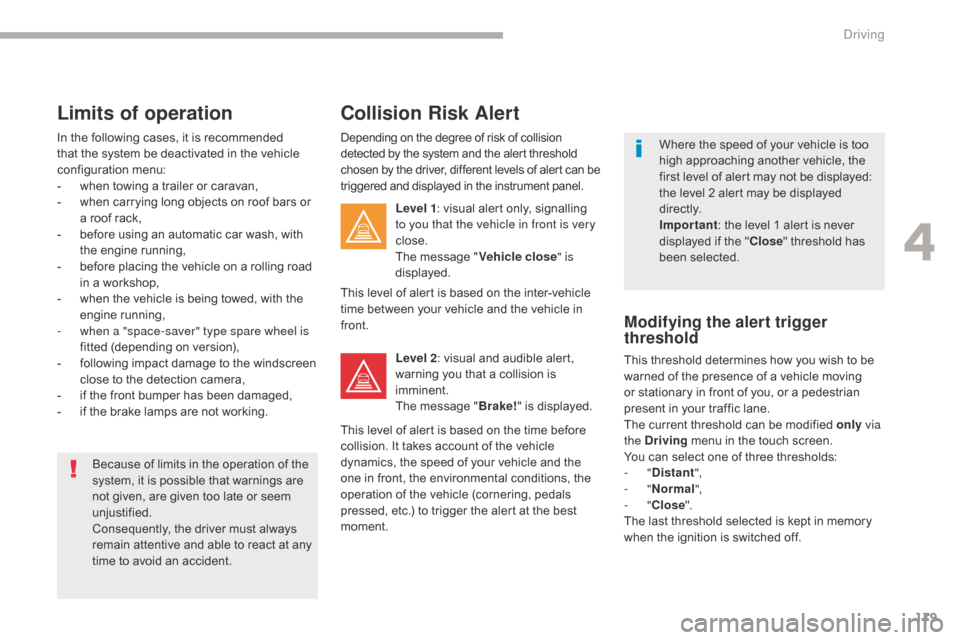
179
C4-Picasso-II_en_Chap04_conduite_ed02-2016
Limits of operation
In the following cases, it is recommended
that the system be deactivated in the vehicle
configuration menu:
-
w
hen towing a trailer or caravan,
-
w
hen carrying long objects on roof bars or
a roof rack,
-
b
efore using an automatic car wash, with
the engine running,
-
b
efore placing the vehicle on a rolling road
in a workshop,
-
w
hen the vehicle is being towed, with the
engine running,
-
w
hen a "space-saver" type spare wheel is
fitted (depending on version),
-
f
ollowing impact damage to the windscreen
close to the detection camera,
-
i
f the front bumper has been damaged,
-
i
f the brake lamps are not working.Because of limits in the operation of the
system, it is possible that warnings are
not given, are given too late or seem
unjustified.
Consequently, the driver must always
remain attentive and able to react at any
time to avoid an accident. Where the speed of your vehicle is too
high approaching another vehicle, the
first level of alert may not be displayed:
the level 2 alert may be displayed
di r e c t l y.
Important
: the level 1 alert is never
displayed if the " Close" threshold has
been selected.
Collision Risk Alert
Depending on the degree of risk of collision
detected by the system and the alert threshold
chosen by the driver, different levels of alert can be
triggered and displayed in the instrument panel.
Level 1: visual alert only, signalling
to you that the vehicle in front is very
close.
The message " Vehicle close" is
displayed.
This level of alert is based on the inter-vehicle
time between your vehicle and the vehicle in
front.
Level 2: visual and audible alert,
warning you that a collision is
imminent.
The message " Brake!" is displayed.
This level of alert is based on the time before
collision. It takes account of the vehicle
dynamics, the speed of your vehicle and the
one in front, the environmental conditions, the
operation of the vehicle (cornering, pedals
pressed, etc.) to trigger the alert at the best
moment.
Modifying the alert trigger
threshold
This threshold determines how you wish to be
warned of the presence of a vehicle moving
or stationary in front of you, or a pedestrian
present in your traffic lane.
The current threshold can be modified only via
the Driving menu in the touch screen.
You can select one of three thresholds:
-
"Distant ",
-
"Normal ",
-
"Close ".
The last threshold selected is kept in memory
when the ignition is switched off.
4
Driving
Page 183 of 527
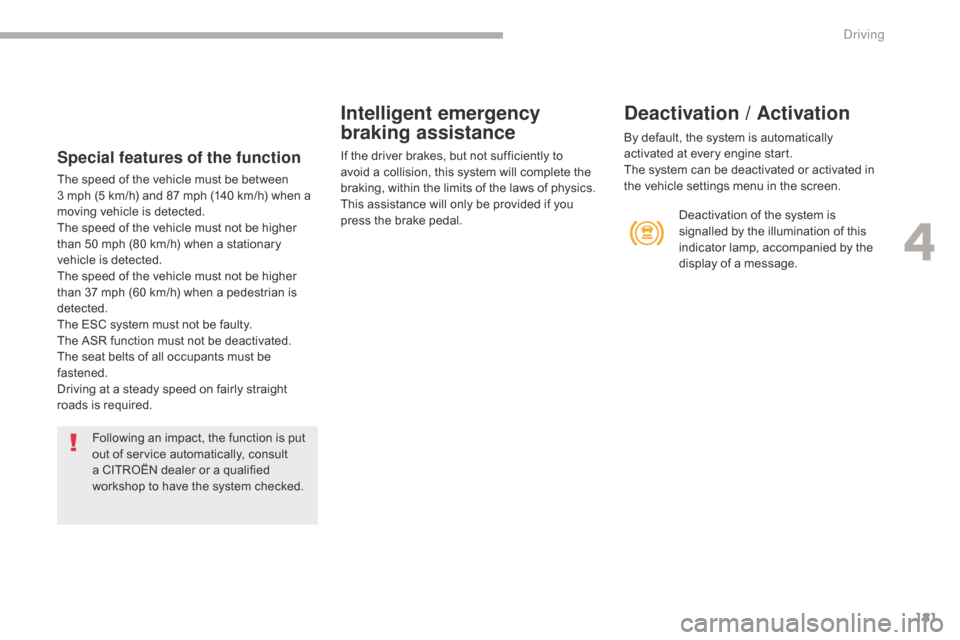
181
C4-Picasso-II_en_Chap04_conduite_ed02-2016
Special features of the function
The speed of the vehicle must be between
3 mph (5 km/h) and 87 mph (140 km/h) when a
moving vehicle is detected.
The speed of the vehicle must not be higher
than 50 mph (80 km/h) when a stationary
vehicle is detected.
The speed of the vehicle must not be higher
than 37 mph (60 km/h) when a pedestrian is
detected.
The ESC system must not be faulty.
The ASR function must not be deactivated.
The seat belts of all occupants must be
fastened.
Driving at a steady speed on fairly straight
roads is required.
Following an impact, the function is put
out of service automatically, consult
a CITROËN dealer or a qualified
workshop to have the system checked.
Intelligent emergency
braking assistance
If the driver brakes, but not sufficiently to
avoid a collision, this system will complete the
braking, within the limits of the laws of physics.
This assistance will only be provided if you
press the brake pedal.
Deactivation / Activation
By default, the system is automatically
activated at every engine start.
The system can be deactivated or activated in
the vehicle settings menu in the screen. Deactivation of the system is
signalled by the illumination of this
indicator lamp, accompanied by the
display of a message.
4
Driving
Page 184 of 527
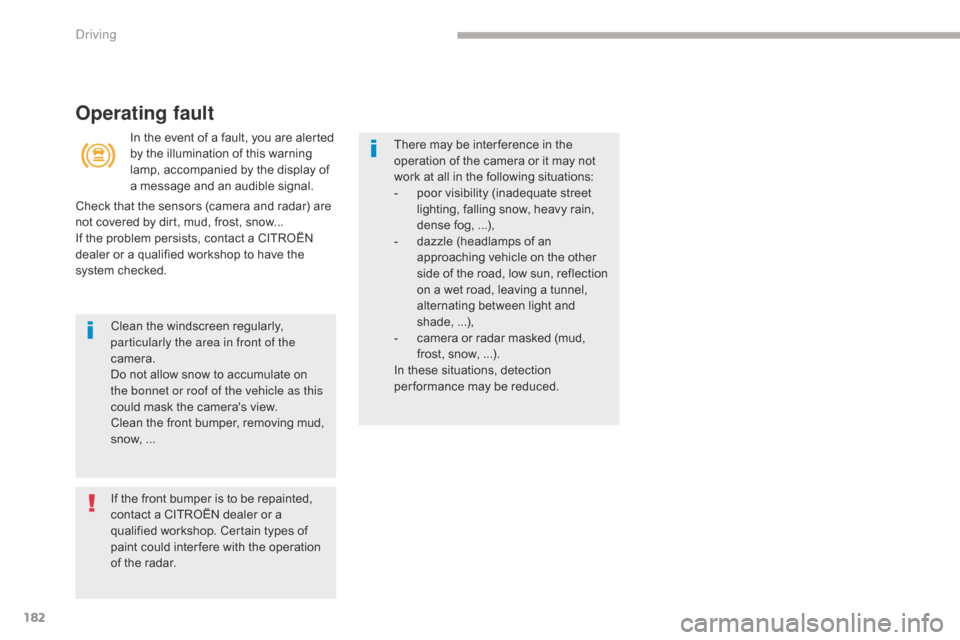
182
C4-Picasso-II_en_Chap04_conduite_ed02-2016
Operating fault
In the event of a fault, you are alerted
by the illumination of this warning
lamp, accompanied by the display of
a message and an audible signal.
If the front bumper is to be repainted,
contact a CITROËN dealer or a
qualified workshop. Certain types of
paint could inter fere with the operation
of the radar. Clean the windscreen regularly,
particularly the area in front of the
camera.
Do not allow snow to accumulate on
the bonnet or roof of the vehicle as this
could mask the camera's view.
Clean the front bumper, removing mud,
snow, ... There may be inter ference in the
operation of the camera or it may not
work at all in the following situations:
-
p
oor visibility (inadequate street
lighting, falling snow, heavy rain,
dense fog, ...),
-
d
azzle (headlamps of an
approaching vehicle on the other
side of the road, low sun, reflection
on a wet road, leaving a tunnel,
alternating between light and
shade, ...),
-
c
amera or radar masked (mud,
frost, snow, ...).
In these situations, detection
per formance may be reduced.
Check that the sensors (camera and radar) are
not covered by dirt, mud, frost, snow...
If the problem persists, contact a CITROËN
dealer or a qualified workshop to have the
system checked.
Driving
Page 187 of 527
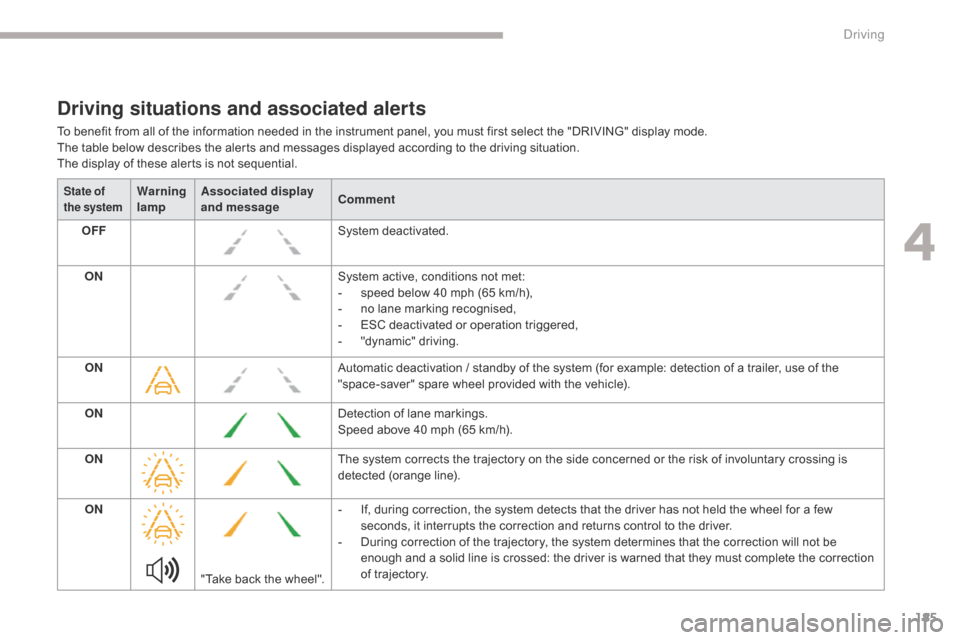
185
C4-Picasso-II_en_Chap04_conduite_ed02-2016
Driving situations and associated alerts
To benefit from all of the information needed in the instrument panel, you must first select the "DRIVING" display mode.
The table below describes the alerts and messages displayed according to the driving situation.
The display of these alerts is not sequential.
State of
the systemWarning
lampAssociated display
and message
Comment
OFF System deactivated.
ON System active, conditions not met:
-
s
peed below 40 mph (65 km/h),
-
n
o lane marking recognised,
-
ES
C deactivated or operation triggered,
-
"
dynamic" driving.
ON Automatic deactivation / standby of the system (for example: detection of a trailer, use of the
"space-saver" spare wheel provided with the vehicle).
ON Detection of lane markings.
Speed above 40 mph (65 km/h).
ON The system corrects the trajectory on the side concerned or the risk of involuntary crossing is
detected (orange line).
ON
"Take back the wheel". -
I
f, during correction, the system detects that the driver has not held the wheel for a few
seconds, it interrupts the correction and returns control to the driver.
-
D
uring correction of the trajectory, the system determines that the correction will not be
enough and a solid line is crossed: the driver is warned that they must complete the correction
of trajectory.
4
Driving
Page 188 of 527
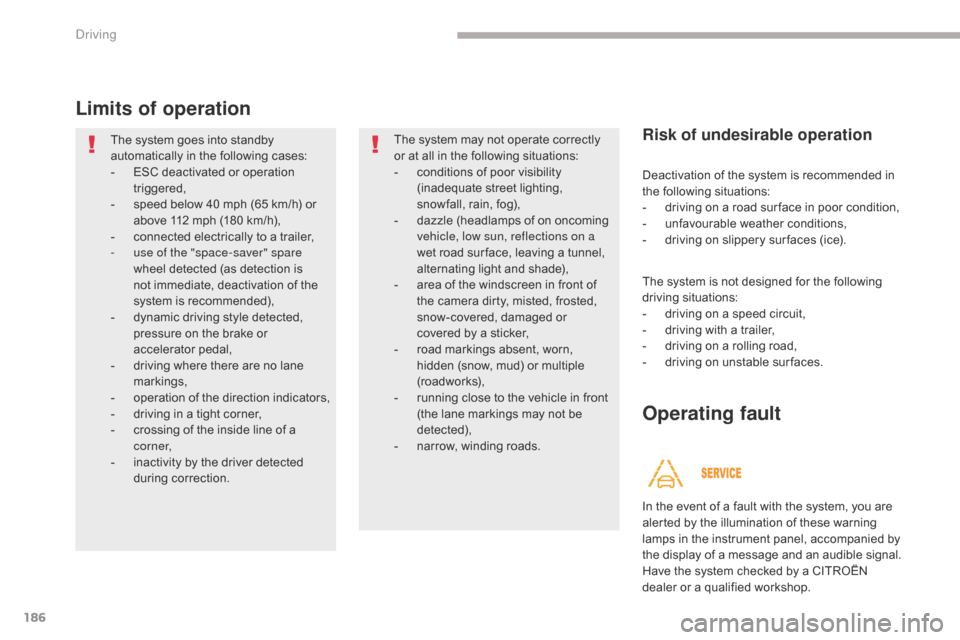
186
C4-Picasso-II_en_Chap04_conduite_ed02-2016
Limits of operation
The system goes into standby
automatically in the following cases:
-
ES
C deactivated or operation
triggered,
-
s
peed below 40 mph (65 km/h) or
above 112 mph (180 km/h),
-
c
onnected electrically to a trailer,
-
u
se of the "space-saver" spare
wheel detected (as detection is
not immediate, deactivation of the
system is recommended),
-
d
ynamic driving style detected,
pressure on the brake or
accelerator pedal,
-
d
riving where there are no lane
markings,
-
ope
ration of the direction indicators,
-
d
riving in a tight corner,
-
c
rossing of the inside line of a
c o r n e r,
-
i
nactivity by the driver detected
during correction. The system may not operate correctly
or at all in the following situations:
-
c
onditions of poor visibility
(inadequate street lighting,
snowfall, rain, fog),
-
d
azzle (headlamps of on oncoming
vehicle, low sun, reflections on a
wet road sur face, leaving a tunnel,
alternating light and shade),
-
a
rea of the windscreen in front of
the camera dirty, misted, frosted,
snow-covered, damaged or
covered by a sticker,
-
r
oad markings absent, worn,
hidden (snow, mud) or multiple
(roadworks),
-
r
unning close to the vehicle in front
(the lane markings may not be
detected),
-
n
arrow, winding roads.Risk of undesirable operation
Deactivation of the system is recommended in
the following situations:
-
d
riving on a road sur face in poor condition,
-
u
nfavourable weather conditions,
-
d
riving on slippery sur faces (ice).
The system is not designed for the following
driving situations:
-
d
riving on a speed circuit,
-
d
riving with a trailer,
-
d
riving on a rolling road,
-
d
riving on unstable sur faces.
In the event of a fault with the system, you are
alerted by the illumination of these warning
lamps in the instrument panel, accompanied by
the display of a message and an audible signal.
Have the system checked by a CITROËN
dealer or a qualified workshop.
Operating fault
Driving